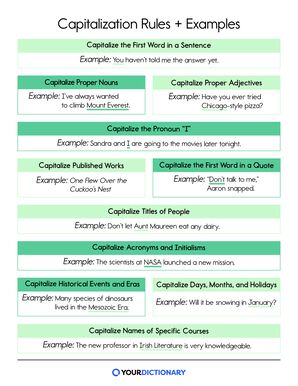

Should you capitalize the word lion? At first glance, you wouldn’t capitalize a common noun in a sentence. But what if lion is the first word in the sentence, or it’s part of a book title — or it comes after the word African? Knowing your capitalization rules can keep your writing — and the lions — under control.
When To Capitalize Words (With Examples)
Starting a word with a capital letter sets it apart from the rest of the sentence. While some capitalization rules may seem confusing, they really do help to clarify your meaning.

1. Capitalize the First Word in a Sentence
Always capitalize the first letter of a sentence, no matter what word it is.
- Ernest was always kind to me.
- You haven’t told me the answer yet.
- Can they have their dessert?
- Never look a lion in the eye.
- If we’re late, we’ll miss our train.
2. Capitalize Proper Nouns
Proper nouns (specific people, places, or things) always start with a capital letter, no matter where they are in a sentence.
- Don’t forget to invite James to the party.
- My favorite teacher is Mrs. Swenson.
- Are you from Germany?
- I’ve always wanted to climb Mount Everest.
- Let’s get McDonald’s on the way home.
3. Capitalize Proper Adjectives
Proper nouns become proper adjectives when they describe nouns. (Note that the common nouns that come after these adjectives are not capitalized, like in the animal name German shepherd.)
- I’m learning to cook French food.
- Hannah plans to recite a Shakespearean sonnet.
- The Buddhist monk finished his studies.
- My new dog is a German shepherd.
- Have you ever tried Chicago-style pizza?
4. Capitalize the Pronoun “I”
You always capitalize the pronoun I in a sentence, just like a proper noun. (It's only necessary to capitalize other pronouns when they begin a sentence.)
- I don't know about you, but I would wait for it to go on sale.
- He said that we can go home, but I’d wait to hear from the manager.
- Sandra and I are going to the movies later tonight.
- I’ve never been to Canada before.
- Can I please go to the concert?
5. Capitalize Published Works
Capitalize all words in the titles of books, movies, poems, and other creative works, unless the words have three or fewer letters. (Title capitalization rules may vary depending on the style guide you use.)
The first letter of a work of art is always capitalized, even if it has fewer than four letters.
- The Glass Menagerie
- A Few Good Men
- One Flew Over the Cuckoo's Nest
- Of Mice and Men
- Spider-Man: Far From Home
6. Capitalize the First Word in a Quote
The first word in a quotation should be capitalized if it’s the beginning of a sentence, or if the quotation is a full sentence.
- The waiter said, "My manager will be here shortly," but he never came.
- Ernest Hemingway famously said, "The way to learn whether a person is trustworthy is to trust him."
- “Don’t talk to me,” Aaron snapped.
- Our teacher explained, “You need to show your work.”
- As my grandfather always used to say, “If you’re bored, you’re ready to work.”
7. Capitalize Titles of People
Capitalize people's titles if they come before the person's name, or if the titles are used instead of the person's real name.
- I’m writing my report on President Abraham Lincoln.
- Ask Mom about the home renovation.
- It’s my pleasure to introduce Senior Marketing Director Sam Jones.
- Can you give Dr. Ryan a call?
- Don’t let Aunt Maureen eat any dairy.
8. Capitalize Acronyms and Initialisms
Acronyms, where the first letter of each word comes together in a new word, are always capitalized. The same goes for initialisms (when you pronounce each letter individually).
- The scientists at NASA launched a new mission.
- FIFA announced new rules for the upcoming World Cup.
- We’ll travel across the USA this summer.
- Has the CIA interviewed you yet?
- The AYSO emphasizes fairness and fun in its soccer games.
9. Capitalize Historical Events and Eras
Names of specific moments in time, whether they lasted a few minutes or millions of years, are capitalized.
- Many species of dinosaurs lived in the Mesozoic Era.
- We learned about the American Revolution in school today.
- President John F. Kennedy faced the Cuban Missile Crisis in 1962.
- My class visited the site of the Battle of Gettysburg.
- Was this painted during the Renaissance?
10. Capitalize Days, Months, and Holidays
Be sure to capitalize days of the week and months of the year (even when they’re abbreviated). Additionally, holidays are also capitalized whenever you write them.
- I’ve got three meetings on Monday.
- Let’s get together next Saturday.
- Will it be snowing in January?
- We’re traveling to Brazil in May.
- Where are you celebrating Hanukkah?
11. Capitalize Names of Specific Courses
Although you don’t need to capitalize the names of subjects (such as math or science), you should capitalize the specific name of the class you’re taking.
- You need to take Algebra II before you sign up for Trigonometry 101.
- Who’s your teacher for Philosophy 2A?
- I already took History of Democracy.
- Let’s study for the midterm in Childhood Education 1B.
- The new professor in Irish Literature is very knowledgeable.
When Not To Capitalize Words
There are a few specific instances that tend to confuse people when it comes to capitalization. Take a look at these general rules for when you should skip that capital letter.
Don't Capitalize After Semicolons and Commas
Semicolons and commas separate parts of a sentence, but they don’t end the sentence like a period or exclamation point. Don’t capitalize the next word as if it’s the start of a new sentence.
- I’ve never seen the ocean; maybe someday I will.
- Paul knows a secret, and he won’t tell it to anyone.
Don’t Capitalize Between Colons and Dependent Clauses
Only capitalize the word after a colon if it starts an independent clause (complete sentence). If the colon introduces a dependent clause or a list, don’t capitalize after it.
- There are three things we need: a tent, a flashlight, and a map.
- She’s earned something she could never buy: the family’s respect.
Don't Capitalize a Common Noun After a Proper Adjective
When a proper adjective modifies a common noun, the noun doesn’t also get a capital letter.
- I met the nicest Australian man on my flight.
- Did you buy a new Honda sedan?
Don’t Capitalize the Four Seasons
Even though the four seasons are special, they’re not proper nouns — so don’t capitalize them.
- We’re traveling to Hawaii next summer.
- Every winter, my family gets together at my grandparents’ house.
Don’t Capitalize Directions
When describing cardinal directions, you don’t need to capitalize them.
- The sun always sets in the west.
- You need to go north for two more miles.
Don’t Capitalize Majors or General Academic Subjects
Unless you’re talking about the specific name of a class, you don’t need to capitalize the general subject or college major.
- Greg majored in computer engineering before starting his graduate degree.
- Have you taken any language arts classes at this school?
Don’t Capitalize Centuries
Periods of one hundred years are often known by their century names, but these are common nouns. Don’t capitalize them.
- The American Civil War occurred in the nineteenth century,
- My parents were both in the twentieth century.
Don’t Capitalize “Birthday” or “Anniversary”
Your birthday or anniversary is definitely as special as a holiday — but the words birthday and anniversary don’t need to be capitalized.
- Let’s celebrate your birthday in style.
- Karen’s ten-year anniversary with the company is next week.
Don’t Capitalize Family Names After Possessive Adjectives
When words like Mom and Grandpa stand in for a person’s name, they’re capitalized. But when they come after possessive adjectives such as my, your, his, her, or their, don’t capitalize them — they’re common nouns.
- Your uncle was my best friend growing up.
- I need to ask my mom if I can go to the concert.
Avoid Capital Mistakes
When in doubt, see if you can identify why you’re capitalizing a word. If you know the rule for capitalizing it, go for it — but if you think it just looks right, try to determine whether that capitalization is really correct.